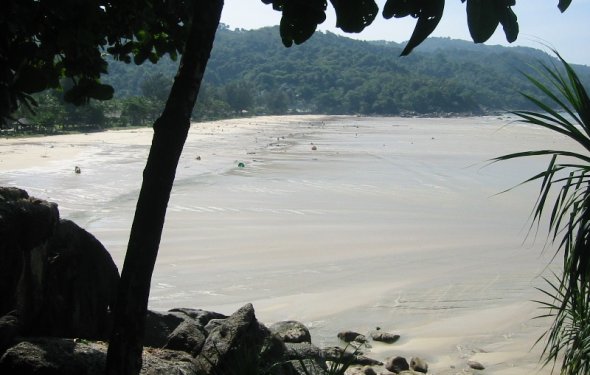kata Noi beach tsunami

 Back to its best - but the tourists are only returning slowly to Patong beach
Back to its best - but the tourists are only returning slowly to Patong beach
Many resorts have been cleaned up but tourists are staying away. Gwyn Topham reports
The Thai Airways inflight magazine had presumably gone to press long before Boxing Day, or its featured choice of Bangkok eating spot might not have been the Marriott hotel's recently opened themed restaurant named, yes, Tsunami.
The article spelt out what this unfamiliar Japanese name meant. Now that everyone knows only too well the destructive power of the tidal wave, the Thai tourist industry is anxious to share other tsunami facts: that much of the coast escaped lightly, that many resorts have recovered completely, and that the absence of foreign holidaymakers' money is compounding the disaster.
Phuket has been a case in point. In Patong, the most popular and developed resort on Phuket, waves smashed through buildings on the seafront. Some major international hotels had to close. So who would consider this island for their next holiday?
In fact, the damage levels vary greatly around each turn in the headland. In Patong, which bore the brunt of Phuket's casualties, the after-effects are still evident. Many buildings on the seafront remain closed, or are now solely occupied by shopkeepers selling their wares on makeshift racks in front of ruined premises.
Yet only 10 miles south on the same coast, those who experienced the tsunami at Kata Noi remember it more as an extraordinary, terrifyingly high tide than as a devastating wave. Unlike at Patong, there were no cars or buildings on the beach to sweep inland. At the Katathani Phuket Beach Resort, which runs most of the length of this small bay, guests were moved, damaged ground-floor rooms were quickly repaired, and most of the holidaymakers - some apparently oblivious to the entire event - continued their stay.
But when they departed, no one else came. Occupancy here and across Phuket is around 10-15 per cent of beds, in what normally is peak season. Most of those at Katathani are long-stay or returning guests, who contacted the hotel direct and made their own travel arrangements.
Of course, Phuket has been relatively lucky: escaping the destruction that occurred elsewhere. But as the deputy governor of Phuket, Supachai Yuwaboon, said: 'To look after the people who suffered from the tsunami means looking after tourism, where so many people work.'
As well as anxiety, there is some anger in the local tourist industry - misplaced or otherwise - at television coverage that did not make clear, they claim, that the situation in Phuket is nothing like that in devastated Khao Lak and the Phi Phi islands. Uwe Lukas, general manager of Katathani, says that only now are bookings for his hotel outnumbering the cancellations.
So what does it look like now? Largely empty beaches and clear waters. Local consensus is that they have not seen Patong beach as beautiful in decades. According to Dr Wanchai Sattayuthipong, Phuket's deputy chief medical officer, the sea water quality has improved dramatically since the tsunami.
Phuket's marine biological centre found that 40 per cent of the dive sites they assessed were unscathed, and only 13 per cent seriously damaged. Rene Balot, director of Sea Fun Divers, says: 'Right now, if you want to see a seahorse, I can show you one. If you want a leopard shark, I can take you to one. The boats aren't there.' With work scarce, the professional divers have been cleaning up the reefs.
Virtually alone on Kata Noi beach was Rory Stanley, from Ireland but currently living in Shanghai, playing in the sea with his sons. 'Everyone advised us not to go; they said you must be crazy. My wife is German, and the German press were all talking about the damage and disease. Instead it's very peaceful, but too quiet for the kids.'
Walking around Phuket's resorts you can find plenty of reasons to visit - wonderful, cheap food; clean seas; an hour-long Thai massage for 200 baht (less than £3); and wonderful beaches without the crowds. British tour operators are now selling Phuket again, and the message from everyone here, from the authorities to the hawkers on the beach, is the same: it's safe, beautiful, clean, and tourists are - more than ever - extremely welcome and, for an economy that depends on them, badly needed.
Get away
Thomas Cook Signature (0870 443 4580; tcsignature.com) has a saving of £260 on a five-night stay at the Katathani Phuket Beach Resort for departures on 1 March. The price of £659pp includes a junior suite, B&B, flights with Thai Airways to Bangkok and onwards to Phuket and transfers. Extra nights are available at £22 per person (was £53).